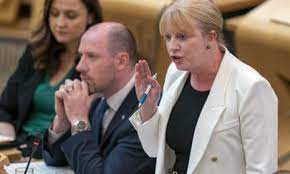UK house prices to ‘fall up to 4%’ in 2024; business activity picks up in December – as it happened

London: Business output growth edged up to a six-month high in December, led by a faster recovery in the service economy while factories continued to cut back production, according to the latest flash estimate from the S&P Global / CIPS purchasing managers’ index (PMI) survey. It said:
UK private sector output expanded for the second month running in December, which continued a modest recovery from the downturn seen during the three months to October. Higher levels of business activity were supported by a renewed improvement in order books, alongside efforts to work through post-pandemic backlogs.
The main index rose to 51.7 in December, from 50.7 in November, the highest since June and pointing to a faster expansion.
UK house prices will fall by up to 4% next year as high interest rates continue to affect mortgage affordability and sales completions, according to Halifax.
Britain’s biggest mortgage lender said the price of an average UK property would fall by between 2% and 4% but it expected a part-recovery in the market as interest and mortgage rates eased next year.
“Overall, with the combination of cost of living pressures and interest rate levels that are still much higher than even two years ago, we will likely see continued mild downward pressure on house prices,” said Kim Kinnaird, the director of Halifax Mortgages.
A separate forecast by Nationwide was slightly more upbeat about prospects for 2024. The UK’s biggest building society said it expected UK house prices to similarly suffer a “low single digit decline” but added that they could remain “broadly flat”.
Business output growth edged up to a six-month high in December, led by a faster recovery in the service economy while factories continued to cut back production, according to the latest flash estimate from the S&P Global / CIPS purchasing managers’ index (PMI) survey. This means the UK probably avoided recession, at least for now, economists said, despite a 0.3% contraction in GDP in October, according to official figures.
The eurozone is headed for recession, as the downturn in business activity deepened, according to a sister survey.
Thames Water’s parent company has been hit by a second downgrade to its credit rating in six months, with Moody’s warning of “materially” increased risks that regulators will block the flow of dividends.
An independent review has found no evidence that NatWest Group’s private bank Coutts has been closing customer accounts due to their political views, but found it may have breached rules by failing to give due notice or explain why they were being shut.
The energy watchdog has set out plans that would result in households paying an extra £16 on top of their energy bills to help suppliers recover almost £3bn in bad debts from customers struggling to pay bills.
Almost 200 homes in London have been sold for £10m in the past year as the super-rich’s pandemic-inspired desire for a place in the country wanes compared to their wish for swish bolt-holes in the capital.
Pearson’s biggest shareholder has said it should be relisted in the US, arguing that leaving London would be better for shareholders as most of the education publisher’s business and rivals are based in North America.
Chris Williamson, chief business economist at S&P Global Market Intelligence said: “The early PMI data indicate that the US economy picked up a little momentum in December, closing off the year with the fastest growth recorded since July.
Looser financial conditions have helped boost demand, business activity and employment in the service sector, and have also helped lift future output expectations higher. However, the increased cost of living and cautious approach to spending by households and businesses means the overall rate of service sector growth remains far short of that witnessed during the travel and leisure revival back in the spring and summer.
Manufacturing meanwhile remains a drag on the economy, with an increased rate of order book decline prompting factories to reduce production, cut back on headcounts and scale back their input buying. “Despite the December upturn, the survey therefore signals only weak GDP growth in the fourth quarter.





